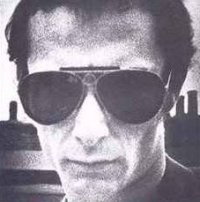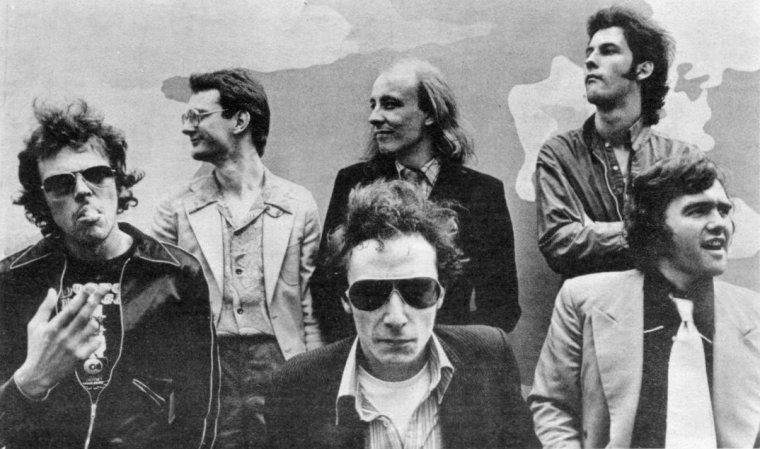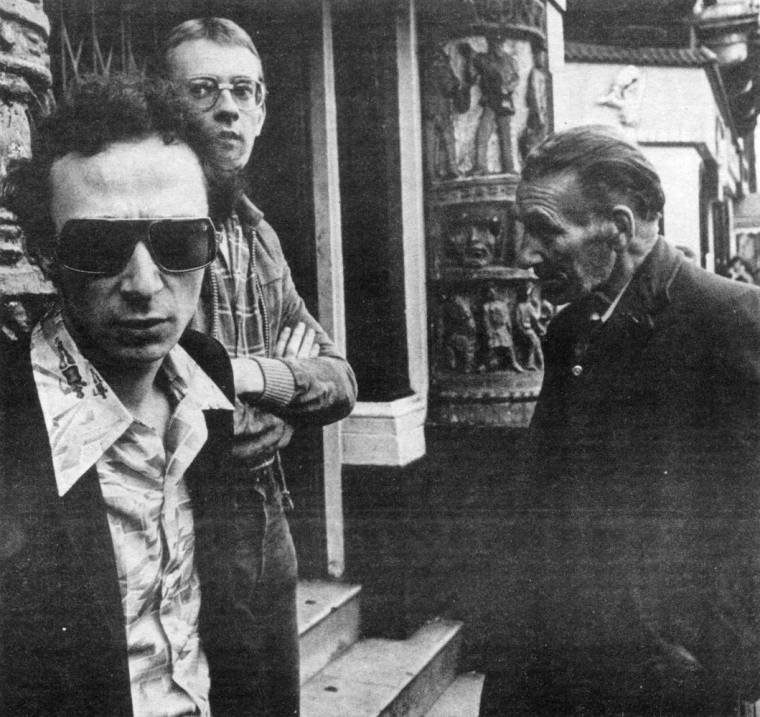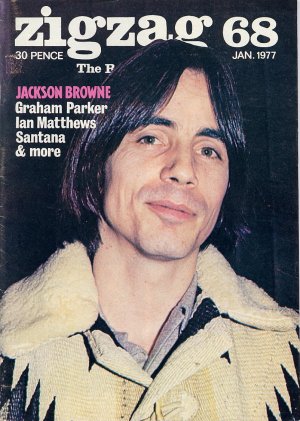
PARKER

 |
GRAHAM PARKER |
 |
Now that that most extraordinarily tedious and self-indulgent of rock'n'roll years has finally stumbled to some sort of half-assed conclusion, I am able to look back with satisfaction and genuine pleasure on only a few scattered instances when rock’n’roll tore me away from my boredom and my fantasy world of sun-kissed beaches, never-ending tequila and beautiful senoritas, and made sense to me again. You’re probably not the least bit interested, but for two glorious weeks of that dull year, I abused and wasted my time in foreign parts, staring at the ocean and consuming what must have been exceedingly unhealthy quantities of dreadful Spanish beer, and do you know what? ... I didn’t give a hoot for what was happening in England; the thought of the great gigs I might have been missing meant sweet nothing to me; I didn’t miss my daily dose of rock’n’roll one little bit! When I finally arrived home and waded my way through the music papers, the first thing I wanted to do was turn round and go back again!
To be precise, my interest in rock’n’roll music was at its lowest ebb ever last year, and apart from my extended sojourn of convalescence at the lovely Greenacre Mansions just outside Cambridge, it’s the main reason why my elegant prose didn’t grace these pages all that often. But now, with 1976 mercifully behind us, I can feel the tide about to turn. There is most definitely something in the air", and it’s quite possible that 1977 could be a cracker of a year. And it will be if Graham Parker & The Rumour have anything to do with it.
After all that has been said and written about them, Graham’s two immaculate albums remain in a class of their own this year, so far superior to the appalling amount of duff vinyl that gets shoved out as to make them absolutely essential purchases. They also completely justify his obscurity-to-stardom persona, which could otherwise have seemed like another typical record company hype job. You can read about Graham Parker’s heroic struggle to elevate himself from the realms of the mundane and into the super-star bracket in a moment, but first a few preliminary facts...
One Sunday lunchtime during the summer of 1975, well-known DJ and author Charlie Gillett played a song called ‘Between You And Me’ by Graham Parker & the Rumour on his Radio London show ‘Honky Tonk’. One attentive listener that Sunday was Phonogram A&R man Nigel Grainge, who, having assessed in a flash the vast potential that Graham and his band displayed, immediately contacted Charlie to enquire who and where was Graham Parker and the Rumour.
The reply he received went something along the lines that Graham Parker, besides being an excellent songwriter, had no heavier credentials than the experience of being an ex-petrol pump attendant from Camberley, and the Rumour were a sort of pub-rock ‘Supergroup’, consisting of: Brinsley Schwarz - guitar, keyboards and sax; Bob Andrews - keyboards; Stephen Goulding - drums; Andrew Bodnar - bass (the latter two both ex-Bontemps Roulez); and Martin Belmont - guitar (ex-Ducks Deluxe). They were at that time rehearsing and recording in the old studio at the Hope & Anchor, and were being managed, as they still are, by Dave Robinson.
Anyway, Nigel Grainge signed them up, and so far they’ve had two albums released, plus an ‘official’ bootleg recorded ‘live’ at Marble Arch. Despite a somewhat less than effusive review of the first album, ‘HOWLING WIND’, by Mac in ZZ60, they’ve managed to build up a large and enthusiastic coterie of followers, and mark my words, before next year’s too old they’re gonna be big Big BIG. Those of you with memories will, of course, recall that there should have been a proper article on Mr. Parker in the aforementioned ZZ60, bit for reasons only known to those fools up in the wilds of Bucks County, it didn’t come together. I therefore took it squarely upon my own shoulders, via an interview with the man himself, to present you with all the details of Graham Parker’s long and varied history...
"My long and varied history! As far as I can remember I was writing when I was about 12 or 13, and I also had a group called the Deep Cut Three; I was born in London, but grew up in Deep Cut, Camberley. The Deep Cut Three changed to the Black Rockers, and we used to wear black polo neck jumpers and tight, black jeans. I used to write songs and weld play Beatles’ material and stuff - that was about 1963. We used to play in a workingman’s club down the road, and in this garage shop on Sundays, when all these little kids would come round and pay threepence to see us and scream at us. Then I suppose I gave it up for a bit to go fishing, but started up again when the electric guitar craze came in heavily.
"My dad got me an electric guitar, and I formed an R’n’B band - this was in 1965 when I was 15. Again we were doing a few of my own things - I just found it was easy to write, although it was probably nonsense then - but we also did some Stones and Yardbirds things. We were called The Way Out at one point - it was the time of all those freaky names like the Who - and we used to play youth clubs like Bagshot Youthclub, Black Down Youth club, Camberley, all around the suburbs. I couldn’t really give a damn what happened to us, but it was great fun.
"Even then I was well into R’n’B. There was all this ‘accepted’ Cliff Richard/pop sort of thing still hanging on, and there was R’n’B and blues; and any kid who was any good knew what was happening. Even at school we had a harmonica band where we’d play these R’n’B riffs on the harp... and of course the Stones and the Who were great, because they were in that tradition. That’s who we used to dig really, the American R’n’B greats; we were playing very ‘black’ music, and strangely enough it was much more accepted at that time than it is now.
"And that's about it really - I gave up then. I gave up when I left school ... I thought I was supposed to get a job or something, and be sensible. I hadn’t been writing much then either. I just gave it up. Actually, at that time when I left school, I was really into dancing and going to discos. I was into soul - Otis Redding and all that. I thought brass instruments were where it was at, so I just stopped playing guitar... and that was it for years.
"After I left school at 17, I had a job for about two years in an Animal Virus Research Institute, breeding animals. I think back on it now, and it just seems like a day. It was of no importance really... it was just a rest period. But I realised it wasn’t doing me any good, so I left home and just started trailing around.
"I left home when I was about 19, and I was well into Peter Green by then - he was my idol just after the ‘soul boom’. The English blues thing with John Mayall and all those people was coming up, and I used to go along and see Peter Green, and I just couldn’t believe it. I remember I used to try and play like him... I still am. But there were millions of other people trying to do it as well, so I realised that it wasn’t worth it. I knew I couldn’t be a great technical player, because I was too lazy.
"I went to Guernsey, took an acoustic guitar with me, just dossed around, took a load of acid - all the usual shit. I worked in a bakery. I used to go around collecting money from pinball machines as well for this guy who owned a cafe there. I was also sort of learning acoustic guitar - folky things, because I was well into the Incredible String Band then and other stuff from that era - King Crimson and so on. It was amazing then, because all this music was coming up, and unless you’d taken acid you couldn’t understand it. So you felt part of a movement when you knew what they were balking about, but nobody else did. It was just like R’n’B again really... just like finding that.
"I eventually came back to England from Guernsey and then I dossed around - sometimes it seems I went for ages without working. I didn't know what I was doing - sponging off my parents, I suppose. But I did lose my way really heavily about that time. I got this job working on hydraulic presses in a factory where you have this fucking great machine, and you press these buttons, and a strip of metal goes through and it knocks out a disc brake. I was dressed in a boiler suit, a real acid case really, and I didn’t know what I was doing. I was cutting my hands to pieces on these bloody things, and I had to get out of it in the end. I had to go to Morocco ... I had to go from one extreme to the other.
"I was actually in Morocco for about six months, until I ran out of money, when I went to Gibraltar and joined a band. We were called Narziss... I don’t know what that was all about, but I joined them, and I was also playing acoustic guitar solo at the same time; I managed to get on Gibraltar TV, which wasn’t very hard. The songs I was doing then were really so strange; they were sort of Incredible String Band acid-anthem things, but they always had this R’n’B flavour which always came through - and that’s why it was difficult when I played with this band, because they were all from Gibraltar, and Santana was the big thing - all that flowy Latin stuff. And although I dug it a lot, I was always putting a hard edge into the music, which fucked them up a bit. So, in effect, I started to lead the band. I mean, I just jumped in as a total stranger and they were millionaires’ sons y’know - they were real dossers, really rich.... they had no money, but they were rich.
"While I was in Gibraltar I was staying in this hotel; they called it the Hotel Continental or something, and it was like six people to a room - bunks. I was working on the docks there in a refrigeration place, unloading all these Birds Eye things from London, or wherever they came from, and taking them to the deep-freeze, and then delivering them around Gibraltar... delivering these frozen chickens and things to shops, which was quite a nice job really, except when you had to go in the freezer, because that was really cold - I had to get some really thick socks for that. Finally this band decided to go to Morocco to do some gigs. So we went there and played a few discos in Tangier. . . and we stayed in this cheap hotel.
"What they wanted out there, though, was funky music – ‘The Funky Chicken' was all the rage - and we were playing ‘space rock’; I was leaning more towards rock things. But anyway, we eventually ended up having a big fight with the manager of one of the clubs and all his greasy little Moroccan minions, because he took our passports and said he had to hold onto them. We got paranoid about it and thought he was going to steal them and sell them, so we charged over the bar one day and demanded our passports, and this guy just freaked out and slugged the drummer in the mouth, at which point all these kids picked up chairs and started bashing us and there were fists flying... the lot. It was amazing really, because we were all spaced-out peace and love, but we pitched in like anything. We ended up going to the police and told them about it, and they cleared it all up, but that was it. That was Morocco finished.

A windswept and earnest Graham Parker, surrounded by the Rumour:
(left to right)...Martin Belmont,
Steve Goulding, Bob Andrews, Andrew Bodnar and Brinsley Schwarz.
Photo by Adrian Boot.
"That was when I came back to England... I must have been 21, I suppose. I was writing a great deal at that time, and I knew that I had to find a band who could play all this stuff. I met a publisher guy (Stuart Johnson) who had a studio, and I used to go in there and play my songs on the acoustic guitar, sometimes with a few friends - and he would take the songs round to record companies. Nothing really happened - a few people were impressed by the songs but said I had to have a band. The singer/songwriter boom was over, and they weren't signing people up just because they could write songs anymore. So I missed James Taylor, I missed that bit, which is probably fortunate in a way. But I did a publishing deal with Stuart... that’s Tower Bridge Music – he’s got ‘Back To Schooldays’. He’s also got a load of my very old stuff which is no good really.
"I also met a slide guitarist named Noel Brown at the same time as I met the publisher. I met Noel through an ad in MM... I just thought out of desperation "Well, how do you meet people who are good?" I knew there were good musicians who had some kind of feeling for what I was doing, but I didn't know how to meet them. I’d been around the world, passing around, but I’d never really been into London, although I was born here. And then I thought that maybe all the good musicians were in America, although I didn’t particularly want to go to America for some reason.
"Anyway, I put this ad in the paper, and Noel Brown was one of the people who answered it, and he seemed to be the only person with any real suss as to what I was doing. He introduced me to Paul Riley of Chilli Willi & the Red Hot Peppers, and Paul introduced me to Dave Robinson. I did a demo tape with a couple of friends in Camberley, and Noel and Paul and a few other people - 'Back To Schooldays’ and a few other songs. Paul then took this tape along to Dave Robinson who said "Bring him along and we’ll try something". So I went to the Hope & Anchor, we did some of my songs, Dave liked them, and that was it really."
He cut some demos with Dave Robinson, and that brings us up to the point where 'Between You And Me’ was played on 'Honky Tonk' and Graham Parker and the Rumour signed with Phonogram.
"There were a few other companies, I suppose, but there was something about Phonogram that was just right. I had about 15 songs together for ‘Howling Wind’; it was about Autumn 1975 that I signed the deal, and everything since then has happened extremely quickly. We've toured with Ace, Kokomo, Thin Lizzy, and then another one by ourselves, which was pretty successful, I’d say."
A very important factor behind the mercurial rise to his current status seems to be the thoroughly sensible decision to steer clear of the highly restrictive pub-rock circuit.
"Yeah that's true. I mean I didn't know... to me, playing in a London pub was the biggest thing possible, it was like stardom. But I soon realised that pubs are where people play because they haven’t got anywhere else to play, right? And the band were really fed-up with being tagged ‘pub rock', so they helped me to realise what direction to go in."
It occurs to me now that I probably haven't made it unmistakeably apparent just how good a band the Rumour are. Well they are. The talents of the individual members will, I’m sure, need no analysis, and let’s just say that I can’t think of or imagine any other band who could handle Graham’s songs so perfectly. What is more they're going to record their own album, without Graham, this month.

|
| Adrian Boot |
"The Rumour were actually a band in their own right before I met them. They were together and they were wondering what to do about it, because they had a few songs and they were doing a few numbers that Dave Robinson had in mind - cover versions of things. They weren't thinking about going on the road so much, but they were a unit. I met them about July last year, and Dave suggested I should get it together with them. Then I went on holiday to think about it, and at the end of July I came back and said "Yeah, let’s give it a try"."
I personally find it extremely pleasing to see Brinsley Schwarz and Bob Andrews in particular reaping some sort of reward for their services to rock music over the last seven years. Nick Lowe too. As a producer he’s building up the sort of reputation from which legends are made. He produced the first Graham Parker album and one track on the second.
"We were originally going to have this guy called Tim Moore produce the first album - an American singer and writer, he wrote 'Second Avenue’ for Art Garfunkel - but he got exhausted on a European tour, so he blew it out at the last minute. So Dave suggested Nick Lowe. I didn’t know Nick Lowe, what he could do or what he couldn’t do... I hadn’t even heard him sing or anything. I hadn’t heard the Brinsleys. So I said "Yeah, okay, I've trusted you so far, I’ll go along with it". And Nick Lowe was just right. Looking at the two albums, though, I think ‘HEAT TREATMENT’ (the second one) is much more open. It is not so basic. I want to make ‘total music’, so I don’t care about sticking to roots or being experimental. That’s what good music is to me, really, it leans in lots of ways. I think it will probably come out even more later on. I want it to keep rocking, but I don't want to end up as a parody of myself. That’s why I wanted a different producer on the second album (Robert John Lange) and a different studio... a different approach just to keep it healthy".
Well, I’d say that right now things are looking more than healthy. If you are reading this at the beginning of January, when you should be, Graham and the band will be in America where, so my spies tell me, they’re threatening to be enormous. ‘Heat Treatment' is picking up the massive radio coverage it deserves (it is definitely one of my albums of last year) and, unbelievably, their best is certainly still to come. Not bad for an ex-petrol pump attendant, eh?
(Much mirth) "Well, I was doing that job when I met that publisher for the first time, and I was doing it as a morning job up until I went to the Hope & Anchor. All I wanted was a little job where I could get a few bob in and keep writing in the afternoons. It’s funny, because people come up to me and ask me "Did you really do that? Is it true?" And they think it’s really great".
Andy Childs
 From Zigzag #68, 1/1977
From Zigzag #68, 1/1977
Thanks to Stephen Towler for his great help with this article!
Back to GP article bibliography